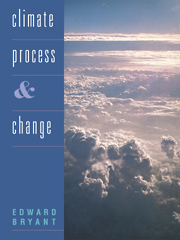1 - Climate history of the Earth and background concepts
Published online by Cambridge University Press: 05 June 2012
Summary
RATIONALE
A cursory examination of historical climate records, media archives or the recent climate literature will indicate that the Earth's climate, as characterised by temperature, precipitation and extreme hazard events, is undergoing change. Unfortunately, many recent scientific and popularised reports imply that this change is dramatic and related to global warming caused by the enhanced ‘greenhouse’ effect. This is not necessarily correct, and today in the late 1990s enhanced ‘greenhouse’ warming has not been conclusively substantiated. The debate is not necessarily over the question of ‘greenhouse’ warming, but rather over the question of whether or not the signatures of that warming have risen irrefutably beyond the background level of noise inherent in the Earth's climate. There is very little material in the current literature that the inquisitive student can find presenting alternative reasons for the observed climate change of the past century. Certainly, little appears in recent published literature about the uncertainties of enhanced ‘greenhouse’ warming. This is unusual given the fact that, as recently as twenty years ago, a similarly emotional debate was raging over the question of global cooling due to increased atmospheric dustiness. It is odd that climatic evidence over such a short space of time should support these two contrasting hypotheses.
In teaching climate change, I am continually amazed by the naivety of many people's arguments concerning basic climatic processes, the nature of past climate change, and society's response to that change.
- Type
- Chapter
- Information
- Climate Process and Change , pp. 1 - 14Publisher: Cambridge University PressPrint publication year: 1997



